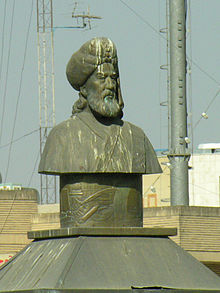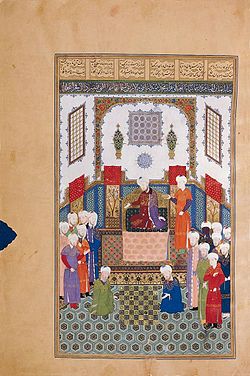Bozorgmehr
Bozorgmehr | |
|---|---|
 | |
| Native name | Dādburzmihr |
| Died | 580s |
| Allegiance | Sasanian Empire |
| Rank | |
| Relations | Sukhra(father) |
Bozorgmehr-e Bokhtagan(Middle Persian:Wuzurgmihr ī Bōkhtagān), also known asBurzmihr,DadmihrandDadburzmihr,[1]was anIraniansage and dignitary from theKaren family,who served as minister (wuzurg framadār) of theSasanianking (shah)Kavad I(r. 498–531), and the latter's son and successorKhosrow I(r. 531–579). He also served as the military commander (spahbed) ofKhwarasanunder Khosrow I and his successorHormizd IV(r. 579–590). According toPersianandArabicsources, Bozorgmehr was a man of "exceptional wisdom and sage counsels" and later became a characterisation of the expression. His name appears in several important works in Persian literature, most notably in theShahnameh( "The Book of Kings" ).[2]The historianArthur Christensenhas suggested that Bozorgmehr was the same person asBorzuya,but historiographical studies of post-Sasanian Persian literature, as well as linguistic analysis shows otherwise.[2]However, the word "Borzuya" can sometimes be considered a shortened form of Bozorgmehr.[3]
Name
[edit]The name of theBozorgmehr(meaning "large sun" or "one of great kindness" ) is theNew Persianvariant of Middle PersianWuzurgmihr ī Bōkhtagān,which was later transformed inArabicasAbūzarjmehr,Bozorjmehr,orBūzorjmehr.[2][4]Ferdowsiused the last variant in theShahnameh( "The Book of Kings" ).[2]Etymologically the latter is a corruption ofBurzmihrorDād-Burzmihr,also reported asZarmihr.[4]Its proper version wasDādburzmihr,withBūrzūmihrbeing the original variant in ancient engravings.[4][5]The name is attested asDadburzmihr( "given by the highMihr") in a seal, atheophoric namethat emphasizes the Mihr worship of Bozorgmehrs clan, theKarenids.[6]The-i Bōkhtagānsuffix is apatronymicname meaning "son of Bokhtagan", a title held by Bozorgmehrs father.[4]
Background
[edit]Bozorgmehr is first mentioned in 498, as one of the nine sons of the powerful noblemanSukhra.[7]He belonged to the House of Karen, one of theSeven Great Houses of Iran,which was descended from theArsacidprinceKaren.[8]The Karen family claimed descent from the legendaryPishdadianshahManuchehr,and were based inNihavandinMedia.[8]After the defeat and death of the Sasanian shahPeroz I(r. 459–484) at thebattle of Herat,Sukhra became thede factoruler of Iran.[9][10]He was eventually defeated and executed byKavad I,which resulted in the Karen family being heavily weakened, with many of its members being exiled to the regions ofTabaristanandZabulistan,which was away from the Sasanian court inCtesiphon.[11][8]In 496, Kavad I was deposed and imprisoned due to his support of theMazdakitemovement, and also for having Sukhra executed.[12][13]
Career
[edit]
After Kavad I had reclaimed the Sasanian throne from his younger brotherJamaspin 498, he appointed Bozorgmehr as his minister (wuzurg framadār).[5]During his tenure, Bozorgmehr persuaded Kavad to stop taxation on fruits and grain from the peasantry.[5]An early reference to Bozorgmehr is found in theAydāgār ī Wuzurgmihr,in which he is called anargbed—a high-ranking title in the Sasanian and Parthian periods. Among other sources, later mention of him is made in the Shahnameh and inal-Tha'alibi’sGhurarandal-Masudi’sMurūj al-Dhahab.[2]During the reign of Kavad I's son and successor,Khosrow I(r. 531–579), Bozorgmehr continued his tenure as minister of the shah. He further rose to prominence after being appointed as a military commander (spahbed) of thekust(frontier region) ofKhorasan(Khwarasan) by Khosrow I, who reportedly regretted Kavad I's approach to the family.[14][8]
During the reign of Khosrow I's sonHormizd IV(r. 579–590), Bozorgmehr continued to serve asspahbedof the Khorasan.[5]Two seals of Bozorgmehr have been found; Through both of them Bozorgmehr emphasizes his Parthian ancestry by claiming to be a Parthianaspbed(aspbed-i pahlaw).[1]According toFerdinand Justi,Bozorgmehr was later executed by the order of Hormizd IV.[2]His execution probably lead to the legendary story of the royal resentment reported in various versions by al-Masudi, Ferdowsi, and al-Tha'alibi.[2]The versions of Ferdowsi and al-Tha'alibi, which link Bozorgmehr with the reign of Khosrow I, he was reportedly pardoned by the shah, who was well-known for his fairness.[2]In the version of al-Masudi, Bozorgmehr was linked with the reign ofKhosrow II,where no mention of his execution is made.[2]
Bozorgmehrs descendants continued to remain active in Iran, with one of them,Adhar Valash,ruling Tabaristan andGurganunder the last Sasanian shah,Yazdegerd III(r. 632–651).[15]His grandson,Valash,ruled Tabaristan from 665 to 673.[16][9]
Works
[edit]SeveralMiddle Persian treatiseswere written by Bozorgmehr. Most famous is theWizārišn ī čatrang("Treatise on Chess"), also known as theChatrang Nama("Book of Chess"). As well as;Ayādgār ī Wuzurgmihr ī Bōxtagān,Ketāb al-Zabarj(the original version a commentary onVettius Valens’sAstrologica),Ketāb Mehrāzād Jošnas("Book of Mehrāḏar Jošnas") and theẒafar-nāma( "Book of Victory", a book written in Middle Persian, that was translated into New Persian byAvicenna.[2]
References
[edit]- ^abPourshariati 2008,p. 115.
- ^abcdefghijKhaleghi-Motlagh 1989a,pp. 427–429.
- ^Khaleghi-Motlagh 1989b,pp. 381–382.
- ^abcdMajidi & Negahban.
- ^abcdPourshariati 2008,p. 114.
- ^Pourshariati 2008,pp. 114–115, 379.
- ^Pourshariati 2008,pp. 113–114.
- ^abcdPourshariati 2017.
- ^abChaumont & Schippmann 1988,pp. 574–580.
- ^Pourshariati 2008,p. 78.
- ^Pourshariati 2008,p. 80.
- ^Daryaee 2014,p. 27.
- ^Schindel 2013a,pp. 136–141.
- ^Pourshariati 2008,pp. 114–115.
- ^Pourshariati 2008,p. 303.
- ^Pourshariati 2008,p. 307.
Sources
[edit]- Chaumont, M. L.; Schippmann, K. (1988). "Balāš, Sasanian king of kings".Encyclopaedia Iranica, Vol. III, Fasc. 6.pp. 574–580.
- Daryaee, Touraj(2014).Sasanian Persia: The Rise and Fall of an Empire.I.B.Tauris. pp. 1–240.ISBN978-0857716668.
- Khaleghi-Motlagh, Djalal (1989a)."Bozorgmehr-e Boktagan".Encyclopaedia Iranica, Vol. IV, Fasc. 4.pp. 427–429.
- Khaleghi-Motlagh, Djalal (1989b)."Borzūya".Encyclopaedia Iranica, Vol. IV, Fasc. 4.pp. 381–382.
- Pourshariati, Parvaneh (2017). "Kārin".Encyclopaedia Iranica.
- Pourshariati, Parvaneh (2008).Decline and Fall of the Sasanian Empire: The Sasanian-Parthian Confederacy and the Arab Conquest of Iran.London and New York: I.B. Tauris.ISBN978-1-84511-645-3.
- Schindel, Nikolaus (2013a). "Kawād I i. Reign".Encyclopaedia Iranica, Vol. XVI, Fasc. 2.pp. 136–141.
- Majidi, Maryam; Negahban, Farzin."Buzurgmihr".InMadelung, Wilferd;Daftary, Farhad(eds.).Encyclopaedia Islamica Online.Brill Online.ISSN1875-9831.
